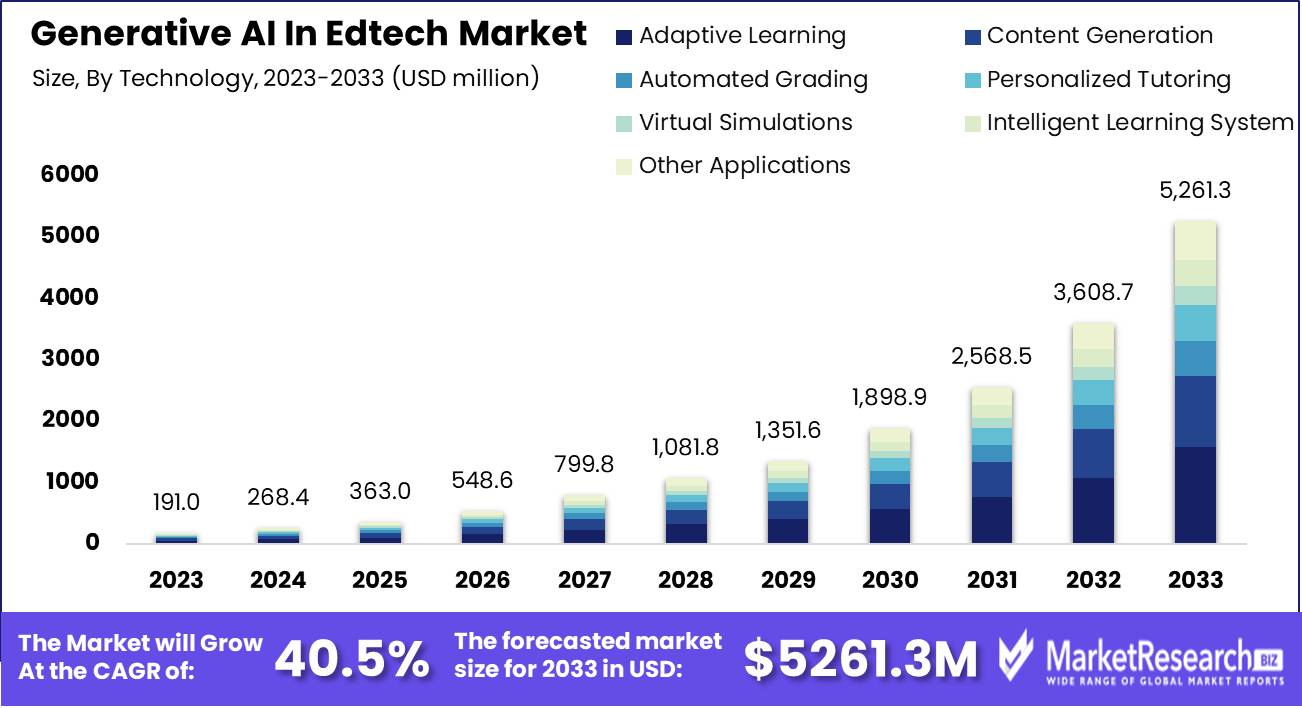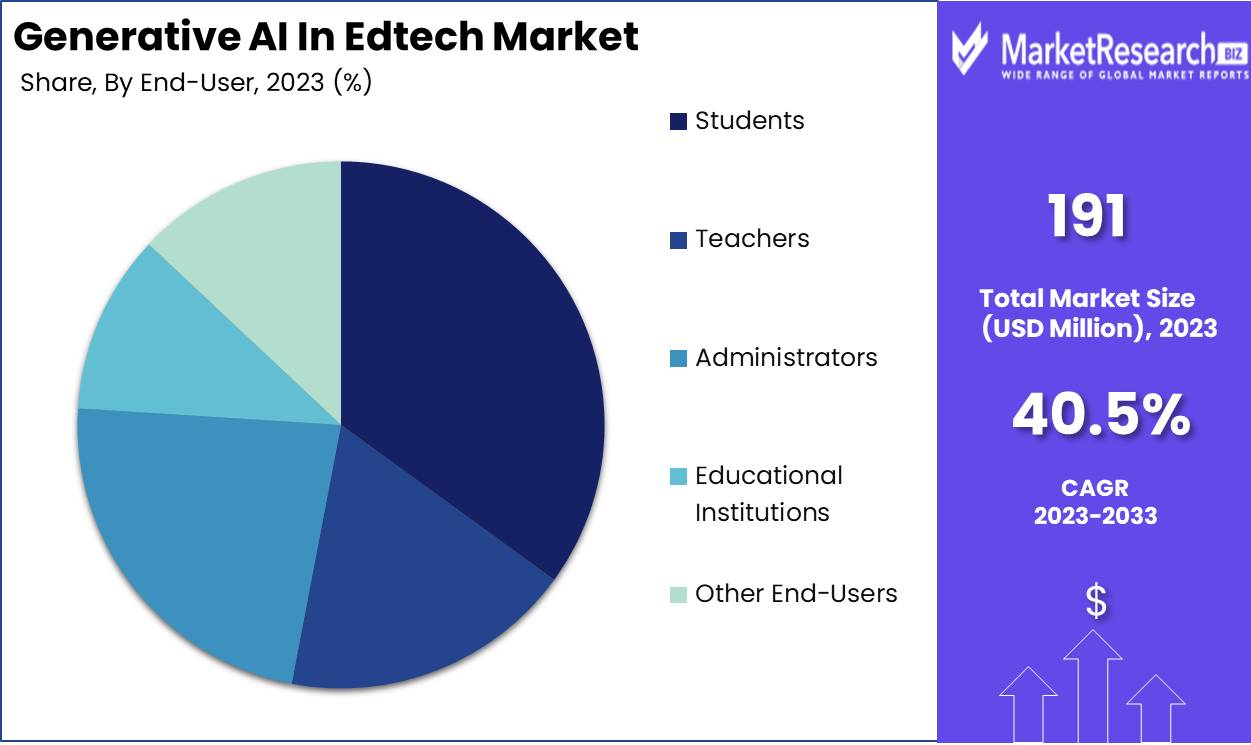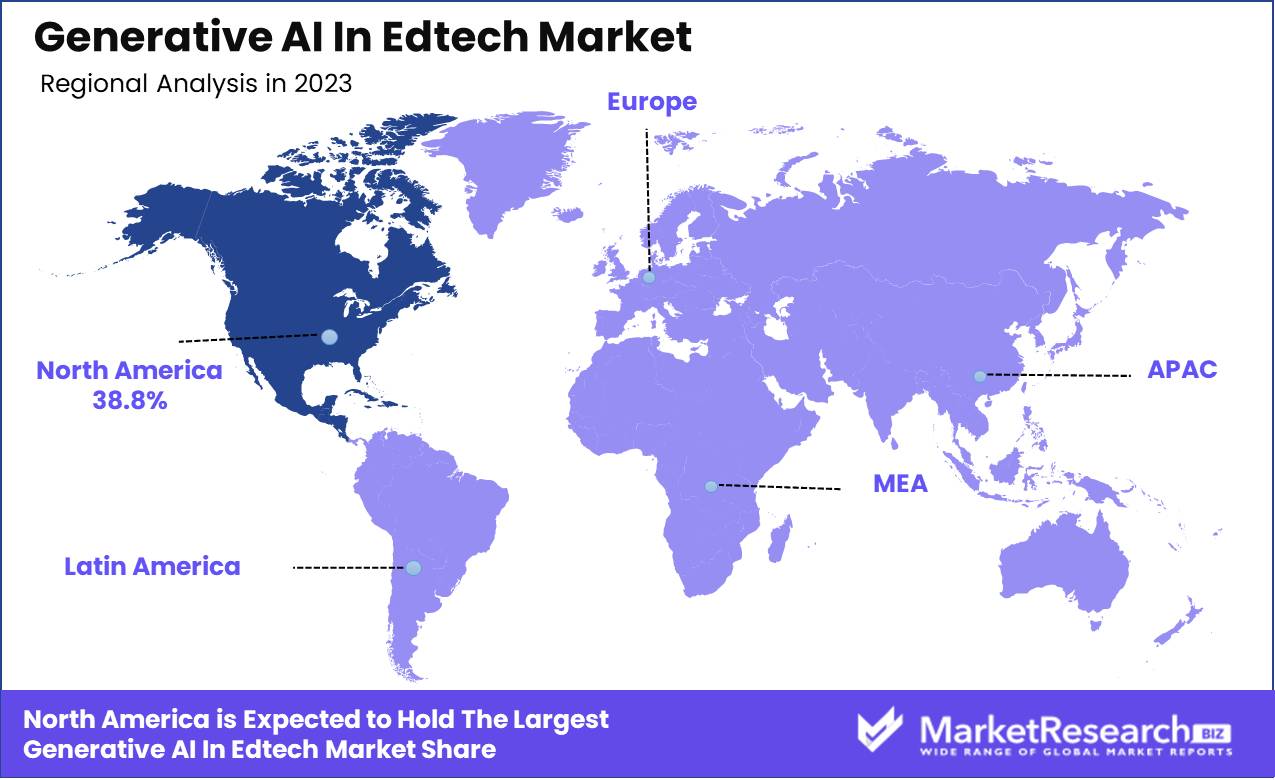
Generative AI in Edtech Market By Technology (Adaptive Learning, Content Generation, Automated Grading, Personalized Tutoring, Virtual Simulations, and Others), By End-User (Students, Teachers, Administrators, Educational Institutions, and Others), By Region and Companies - Industry Segment Outlook, Market Assessment, Competition Scenario, Trends, and Forecast 202-2033
-
37991
-
April 2024
-
300
-
-
This report was compiled by Vishwa Gaul Vishwa is an experienced market research and consulting professional with over 8 years of expertise in the ICT industry, contributing to over 700 reports across telecommunications, software, hardware, and digital solutions. Correspondence Team Lead- ICT Linkedin | Detailed Market research Methodology Our methodology involves a mix of primary research, including interviews with leading mental health experts, and secondary research from reputable medical journals and databases. View Detailed Methodology Page
-
Quick Navigation
Report Overview
Generative AI in Edtech Market size is expected to be worth around USD 5261.3 Mn by 2033 from USD 191 Mn in 2023, growing at a CAGR of 40.5% during the forecast period from 2024 to 2033. The surge in demand for advanced technologies and the rise in education sectors are some of the main key driving factors for the generative AI in the Edtech market.
Generative AI in Edtech is defined as the usage of AI methods, particularly generative models to transform educational technology. It comprises the development of algorithms which capable of designing new educational content like quizzes, whole lessons, and exercises, based on learned structures from existing educational materials and students’ communications. Such advanced technologies make tailor-made learning experiences customized to individual student requirements, choices, and learning styles. Generative AI in Edtech can also make the development of virtual tutors and conversational agents that interact with students in natural language by offering instant feedback and guidance. By using generative AI, Edtech platforms can improve student interactions by enhancing learning results and scale customization education worldwide. However, the ethical considerations about data security and privacy, algorithmic bias, and the responsible use of AI in education are supreme to ensure equitable access and nurture positive learning experiences for all students.

An article published by the Department for Education in January 2024, highlights that the Department has published a position on GenAI in Education on 29 March 2023. Alongside this position, the Call for Evidence on GenAI in Education, and the GenAI Hackathon projects are investing up to £2 million in Oak National Academy to progress and expand their AI tools for teachers. It also offers more than £137 million to the Education Endowment Foundation to encourage innovative and effective evidence-based teaching, including using technology such as computer adaptive learning and AI. Moreover, the utilization of GenAI among teachers and students has rapidly amplified over the last year. By November 2023, 42% of primary and secondary teachers had used GenAI in their role which is an increase from 17% in April. Pupils and students may be using GenAI more than their teachers. 74% percent of online 16-24-year-olds in the UK have used a GenAI tool. 5 Evidence on GenAI use in an educational context shows figures ranging from 14% to 67% of students having used GenAI for schoolwork and studies.
Generative AI in Edtech provides customized learning experiences personalized to individual students’ requirements by improving engagement and comprehension. It makes the development of dynamic and unique content, online teachers, and adaptive assessments, nurturing new innovations, scalability, and accessibility in education while hypothetically minimizing the burden on teachers through automated content production. The demand for generative AI in Edtech will increase due to its requirement in education sectors which will help in market expansion in the coming years.
Key Takeaways
- Market Growth: Generative AI in Edtech Market size is expected to be worth around USD 5261.3 Mn by 2033 from USD 191 Mn in 2023, growing at a CAGR of 40.5% during the forecast period from 2024 to 2033.
- By Technology: In 2023, Adaptive Learning led the Generative AI in the EdTech market with over a 39% share.
- By End-use: In 2023, Students dominated the Generative AI in the Edtech Market, holding over 49% of the segment.
- Regional Dominance: North America leads in generative AI in the EdTech with a 38.8% market share.
- Growth Opportunity: Generative AI will transform EdTech by enhancing content creation and streamlining administrative tasks, driving growth and efficiency.
Driving factors
Rising Demand for Adaptive Learning and Personalization: Catalyzing Customized Educational Experiences
The escalating demand for adaptive learning and personalization in education is a significant driver for the Generative AI market within the tech sector. Adaptive learning systems harness artificial intelligence to modify the content and pace of learning tailored to individual student’s needs, capacities, and learning speeds. Generative AI plays a pivotal role in these systems by creating personalized educational materials and assessments, thus enhancing student engagement and learning outcomes.
Statistically, this demand reflects a broader trend where over 92% of educational institutions are interested in implementing adaptive learning technologies due to their potential to improve student results and operational efficiencies. This growing demand acts as a catalyst for investment and innovation in generative AI technologies, leading to a virtuous cycle of continuous improvement and adaptation in educational practices.
Exponential Growth of Data Volumes in Education: Fueling AI-Driven Insights and Innovations
Education sectors worldwide are experiencing a data explosion, originating from digital learning tools, online resources, and student interaction platforms. This vast amount of data offers unprecedented opportunities for insight and innovation in educational technology. Generative AI leverages this rich dataset to analyze patterns, predict outcomes, and generate content, thereby transforming how educational content is created and delivered.
For instance, AI can analyze data from student interactions with digital tools to tailor educational experiences that are not only engaging but also effective at addressing diverse learning needs. The increasing data availability also supports more sophisticated and accurate AI models, thereby enhancing the efficacy and scalability of AI applications in education.
Integration with Emerging Technologies: Expanding the Horizons of Edtech Capabilities
Generative AI's integration with emerging technologies such as virtual reality (VR), augmented reality (AR), and blockchain is reshaping the educational landscape. This convergence enables the creation of immersive and interactive learning environments that can simulate real-world scenarios or visualize complex academic concepts, thereby making learning more engaging and effective.
For example, integrating generative AI with VR can create dynamic and adaptive learning scenarios that respond to a student’s actions or decisions, providing immediate feedback and personalized guidance. Similarly, when combined with blockchain, generative AI can contribute to the creation of decentralized educational platforms that are secure, transparent, and tailored to individual learning journeys.
Restraining Factors
Privacy and Ethical Concerns: A Dual Challenge to User Trust and Market Adoption
The use of generative AI in educational technology introduces significant privacy and ethical concerns that can restrain market growth. These concerns primarily stem from the handling of sensitive data. Students ' personal and academic information must be managed with utmost caution to maintain confidentiality and comply with stringent regulations such as the General Data Protection Regulation (GDPR) in Europe and the Family Educational Rights and Privacy Act (FERPA) in the United States. Violations or perceived inadequacies in data handling can lead to a loss of trust among users (students, educators, and institutions), potentially resulting in decreased adoption rates.
Ethical concerns also encompass the fairness and bias inherent in AI algorithms. If the training data for generative AI tools are not sufficiently diverse, there is a risk that the models may propagate existing biases, thus affecting the equitable delivery of educational content and assessments. For instance, if an AI model disproportionately favors a particular demographic group's learning style, it may result in an uneven educational experience, raising ethical questions and resistance from educators and regulators.
The combined impact of these privacy and ethical concerns is a cautious approach by educational institutions toward adopting generative AI solutions, potentially slowing down the market's growth as developers and providers work to establish robust ethical frameworks and demonstrate compliance with privacy laws.
Reliability and Quality of AI Models: Essential for Gaining Educational Stakeholder Confidence
The reliability and quality of AI models significantly influence their acceptance in the education sector. Educational stakeholders, teachers, and administrators expect that AI-driven tools not only enhance learning outcomes but also consistently perform at a high standard. Issues such as inaccuracies in content generation, lack of context awareness, or failure to adapt to different learning paces and styles can lead to dissatisfaction and reduced engagement from users.
For example, a generative AI tool that assists in creating customized learning materials must be capable of understanding complex educational needs and producing relevant and accurate content. If the tool frequently requires corrections or fails to align with the curriculum standards, it risks rejection by educators who may view it as more of a liability than a benefit.
By Technology Analysis
In 2023, Adaptive Learning led the Generative AI in the EdTech market with over a 39% share.
In 2023, the Generative AI in the EdTech market was segmented into various technology-based applications including Adaptive Learning, Content Generation, Automated Grading, Personalized Tutoring, Virtual Simulations, Intelligent Learning Systems, and Other Applications. Among these, Adaptive Learning held a dominant market position in the "Based on Technology" segment, capturing more than a 39% share. This significant market share underscores the growing reliance on adaptive technologies that tailor educational experiences to individual learner needs, enhancing both engagement and outcomes.
Adaptive Learning technologies leverage advanced algorithms to analyze student interactions and performance, dynamically adjusting the content and pace of learning. This personalized learning approach not only supports diverse learning styles but also helps in identifying knowledge gaps and recommending targeted interventions. The robust growth in this segment is fueled by increasing demand for customized learning solutions that can integrate seamlessly into various educational settings, from K-12 to higher education and corporate training.
This segment's growth is indicative of broader trends within the Generative AI sector in EdTech, emphasizing efficiency, scalability, and personalized learning pathways. As educational institutions continue to invest in digital transformation initiatives, Adaptive Learning is poised for further expansion. Stakeholders in the educational technology sector are advised to monitor developments in this segment closely, as it offers substantial opportunities for innovation and market penetration, especially in regions with rapidly increasing educational technology adoption.
The prominence of Adaptive Learning within the Generative AI landscape highlights its potential as a cornerstone in the future of educational practices, where technology meets personalized education at scale.
By End-User Analysis
In 2023, students dominated the Generative AI in the Edtech Market, holding over 49% of the segment.
In 2023, Students held a dominant market position in the Based on End-User segment of the Generative AI in Edtech Market, capturing more than a 49% share. This segment outstripped others, including Teachers, Administrators, Educational Institutions, and Other End-Users, highlighting the pivotal role of student-centric applications in driving adoption and innovation. The substantial share held by Students underscores a clear trend: the growing reliance on AI tools for personalized learning experiences, assistance in content creation, and efficient study aids.
The prominence of Students in this market segment reflects broader educational needs and a shift towards more adaptive, responsive educational environments. Tools such as AI-driven tutoring systems, customized learning modules, and interactive learning platforms are particularly resonant with this demographic, catering to their demand for more engaging, tailored educational experiences.
This trend also signifies a potential growth area for developers and investors within the Edtech sector. By focusing on the needs and preferences of this largest user group, companies can strategically innovate to further penetrate and expand their market share. As the educational landscape evolves, the integration of Generative AI into student-focused applications is expected to increase, driven by the advantages of enhanced educational outcomes and personalized learning pathways.

Key Market Segments
Based on Technology
- Adaptive Learning
- Content Generation
- Automated Grading
- Personalized Tutoring
- Virtual Simulations
- Intelligent Learning System
- Other Applications
Based on End-User
- Students
- Teachers
- Administrators
- Educational Institutions
- Other End-Users
Growth Opportunity
Enhancing Educational Content Creation
The application of Generative AI in the EdTech sector presents substantial growth opportunities, particularly in content generation. As educational institutions and businesses seek more adaptive and personalized learning experiences, Generative AI can offer scalable solutions that tailor educational content to individual learning styles and needs. This technology enables the creation of diverse learning materials, including interactive textbooks, customized assessments, and simulated environments, which can significantly enhance learner engagement and understanding. By leveraging AI to generate educational content, providers can not only improve the quality of education but also expand their offerings to untapped markets, thus driving growth.
Streamlining Operations through Automation
Another significant opportunity for Generative AI in the EdTech market lies in the automation of administrative tasks. Schools and educational companies face a myriad of repetitive and time-consuming tasks such as scheduling, student enrollment, and assignment grading. Implementing Generative AI to automate these processes can free up valuable time for educators and administrators, allowing them to focus more on teaching and less on administrative duties. This not only improves operational efficiencies but also reduces costs, thereby enhancing the scalability of educational programs. The automation of such tasks through AI can lead to a more agile and responsive educational system, which is particularly crucial in adapting to the rapidly changing educational needs posed by global trends and technological advancements.
Latest Trends
Embracing Innovation: The Integration of Generative AI in Course Design
As we venture into 2024, the landscape of education technology is witnessing a transformative shift through the integration of generative AI in course design. This technology not only streamlines the creation of educational content but also enhances its adaptability and relevance to diverse learning environments. Educational institutions are increasingly leveraging generative AI to develop customized learning pathways that are both scalable and responsive to individual learner needs. This trend indicates a move towards more personalized education, reducing the one-size-fits-all approach and improving learning outcomes. By automating and optimizing curriculum development, generative AI enables educators to focus more on pedagogical efficacy and less on logistical constraints.
Redefining Learning: Generative AI's Role in Curriculum Development
The global Generative AI in the EdTech market is the integration of AI into curriculum development. Generative AI is being used to not only assist in the creation of learning materials but also to evaluate and refine them based on student performance data. This allows for a continuously improving educational framework that can adapt to the evolving academic and career landscapes. Furthermore, AI-driven analytics are providing educators with insights into student engagement and comprehension, leading to more informed decisions regarding curriculum adjustments. The potential for AI to act as a dynamic partner in curriculum design is immense, suggesting a future where AI tools become essential in crafting educational strategies that are both innovative and inclusive.
Regional Analysis
North America leads in generative AI in the EdTech with a 38.8% market share.
The adoption of generative AI in the EdTech sector exhibits distinct regional dynamics, influenced by varying levels of technological infrastructure, educational policies, and investment priorities. In North America, generative AI's penetration into educational technology is the most pronounced, holding a dominant market share of 38.8%. This robust growth is underpinned by substantial investments in AI technologies, a well-established tech industry, and a proactive stance on incorporating AI into both K-12 and higher education systems. The U.S. and Canada are notable for their advanced use of AI tools in personalized learning, automated assessment, and content generation, aligning with the region's push towards more interactive and adaptable learning environments.

Europe, meanwhile, presents a mixed landscape with strong growth potential, driven by increasing EU regulations supporting digital education and data protection standards like GDPR which influence AI deployment strategies. Western European countries, particularly the UK, Germany, and France, are advancing rapidly, integrating AI to enhance language processing and learning analytics in education. Eastern Europe is catching up, fueled by rising digital transformation initiatives and EU funding for educational innovation, though at a slightly slower pace compared to the West.
The Asia-Pacific region is emerging as a highly dynamic segment in the global generative AI in the EdTech market, characterized by high adoption rates in countries like China, South Korea, and India. These countries are leveraging AI to address large-scale educational challenges, including accessibility and quality standardization. The market is driven by significant governmental initiatives aiming to integrate AI technologies into educational curricula and substantial investments in tech development. This rapid integration is poised to challenge North America's dominance shortly, especially as Asia-Pacific countries continue to innovate and scale their EdTech solutions.
Key Regions and Countries
North America
- The US
- Canada
- Rest of North America
Europe
- Germany
- France
- The UK
- Spain
- Netherlands
- Russia
- Italy
- Rest of Europe
Asia-Pacific
- China
- Japan
- Singapore
- Thailand
- South Korea
- Vietnam
- India
- New Zealand
- Rest of Asia Pacific
Latin America
- Mexico
- Brazil
- Rest of Latin America
Middle East & Africa
- Saudi Arabia
- South Africa
- UAE
- Rest of the Middle East & Africa
Key Players Analysis
The landscape of the global Generative AI in the EdTech market is being shaped by several key players, each contributing uniquely to the evolution of educational technologies through the integration of advanced artificial intelligence. Microsoft Corporation and Google LLC are at the forefront, leveraging their extensive technological infrastructure and R&D capabilities to drive innovation. Microsoft’s AI-driven learning solutions focus on personalized learning environments that adapt to individual student needs, enhancing engagement and outcomes.
Google, with its expertise in AI and machine learning, continues to integrate these technologies into its suite of educational tools, facilitating more dynamic, interactive, and accessible learning experiences.
On the other hand, companies like Cognii Inc., Knewton, and Blackboard are specializing in niche aspects of AI in education, focusing primarily on adaptive learning and assessment technologies. Cognii’s leading-edge natural language processing tools offer detailed feedback to students, thereby refining the learning process. Knewton and Blackboard are advancing adaptive learning technologies that analyze student data to personalize content delivery, thus optimizing the learning trajectory for diverse educational needs. Their technologies are instrumental in creating scalable and efficient learning systems that respond dynamically to the educational challenges posed by varied learner demographics.
Emerging players such as Metacog Inc., Duolingo, and other key innovators also significantly contribute to market dynamism by focusing on specific AI functionalities that enhance learning through unique platforms. Duolingo’s gamified language learning model, underpinned by AI, exemplifies how engagement can be drastically improved through interactive and adaptive learning techniques. Meanwhile, Metacog Inc. is enhancing the capabilities of AI in assessing complex student interactions in digital environments, providing analytics that supports more informed pedagogical strategies.
Market Key Players
- Microsoft Corporation
- Google LLC
- Cognii Inc.
- Knewton
- Blackboard
- Metacog Inc.
- Duolingo
- Other Key Players
Recent Development
- In March 2024, Accenture announced its agreement to acquire Udacity, aiming to enhance its newly unveiled Accenture LearnVantage by integrating Udacity's advanced online learning technologies and expertise in tech education.
- In March 2024, Usher's New Look and IBM announced a collaboration through IBM SkillsBuild to provide free AI and professional skills training to young learners from underrepresented communities. This initiative will focus on AI education and workplace skills to prepare students for future career opportunities.
- In February 2024, Simba Information published a report highlighting new challenges for edtech due to increased generative AI usage in classrooms, focusing on privacy regulations and the need for educational publishers to support teachers and enhance learning with AI tools like EdGPT.
Report Scope:
Report Features Description Market Value (2023) USD 191 Mn Forecast Revenue (2033) USD 5261.3 Mn CAGR (2024-2032) 40.5% Base Year for Estimation 2023 Historic Period 2016-2023 Forecast Period 2024-2033 Report Coverage Revenue Forecast, Market Dynamics, COVID-19 Impact, Competitive Landscape, Recent Developments Segments Covered Based on Technology (Adaptive Learning, Content Generation, Automated Grading, Personalized Tutoring, Virtual Simulations, Intelligent Learning Systems, Other Applications), Based on End-User (Students, Teachers, Administrators, Educational Institutions, Other End-Users) Regional Analysis North America – The US, Canada, & Mexico; Western Europe – Germany, France, The UK, Spain, Italy, Portugal, Ireland, Austria, Switzerland, Benelux, Nordic, & Rest of Western Europe; Eastern Europe – Russia, Poland, The Czech Republic, Greece, & Rest of Eastern Europe; APAC – China, Japan, South Korea, India, Australia & New Zealand, Indonesia, Malaysia, Philippines, Singapore, Thailand, Vietnam, & Rest of APAC; Latin America – Brazil, Colombia, Chile, Argentina, Costa Rica, & Rest of Latin America; Middle East & Africa – Algeria, Egypt, Israel, Kuwait, Nigeria, Saudi Arabia, South Africa, Turkey, United Arab Emirates, & Rest of MEA Competitive Landscape Microsoft Corporation, Google LLC, Cognii Inc., Knewton, Blackboard, Metacog Inc., Duolingo, Other Key Players Customization Scope Customization for segments, region/country-level will be provided. Moreover, additional customization can be done based on the requirements. Purchase Options We have three licenses to opt for: Single User License, Multi-User License (Up to 5 Users), Corporate Use License (Unlimited User and Printable PDF) -
-
- Microsoft Corporation
- Google LLC
- Cognii Inc.
- Knewton
- Blackboard
- Metacog Inc.
- Duolingo
- Other Key Players




